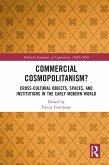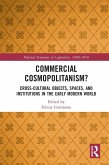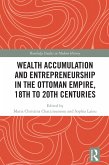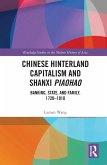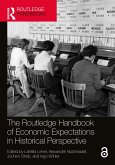This handbook brings together leading international contributors in order to systematically address cultural and intellectual traditions around the globe. Many of these are exposed for consideration for the first time in English. The chapters explore dominant ideas and historiographical trends, and open them up to critical transnational perspectives.
This volume is essential reading for both academics and students in economic and social history. As this field of study is very much a bridge between the social sciences and humanities, the issues examined in the book will also have relevance for those seeking to understand the evolution of other academic disciplines under the pressures of varied economic, political and cultural circumstances, on both national and global scales.
Dieser Download kann aus rechtlichen Gründen nur mit Rechnungsadresse in A, B, BG, CY, CZ, D, DK, EW, E, FIN, F, GR, HR, H, IRL, I, LT, L, LR, M, NL, PL, P, R, S, SLO, SK ausgeliefert werden.
'This Handbook is a splendid introduction to the way economic development and capitalism has been imagined and researched. Even more important, it's a powerful contribution to understanding modern societies everywhere from a world perspective, not just a European/American perspective. Researchers and students from all the social sciences, as well as specialists in economic history, will learn important lessons here.' - Raewyn Connell, Professor Emerita at the University of Sydney, and author of Southern Theory: The Global Dynamics of Knowledge in Social Science.
'To understand contemporary globalization, there is no question that comparative economic history provides an unparalleled vantage point for readers from any discipline. In this volume Boldizzoni and Hudson bring together a superb group of specialists in the field from around the globe.' - Carlos Marichal, Professor of Latin American Economic History, El Colegio de México.
'Boldizzoni and Hudson call to action a number of world experts to debate the contours of economic history for a global age. Whilst economic history has become a global field of research, they claim that it should not be a simple extension of the tools, narratives and methodologies adopted in the West. This book pioneers a new age for economic history.' - Giorgio Riello, Professor of Global History, University of Warwick.
'At last a book that explores the diverse approaches to economic history adopted across the world. A dominant Anglo-American account of the "Rise of the West" or "Great Divergence" is diluted and a new approach to world economic history comes to the fore. This is an important book for academics and university students who are genuinely interested in understanding, researching and publishing on this important subject.' - William J. Ashworth, University of Liverpool.
'This book will become required reading for economic historians who are interested in the historiography of their own field. Global economic history has so often been viewed from a particular national perspective. This book shows how different regions had different academic labour markets and political agendas, and these shaped how economic history was written.' - Helen Paul, University of Southampton.
'Francesco Boldizzoni and Pat Hudson have compiled a fascinating collection of 24 historiographical surveys on the economic history of countries and regions from six out of seven continents of the world, bookended by their introductory essay and their concluding essay. [...] The scholarship in each of the chapters is excellent and the editors are to be saluted for their efforts in recruiting such strong scholars from all corners of the globe. Those with serious interests in economic history will want to consult this volume and at a minimum request it for their library's reference collection.' - David Mitch, Professor of Economics, University of Maryland, Baltimore County, USA (published on EH.net).



